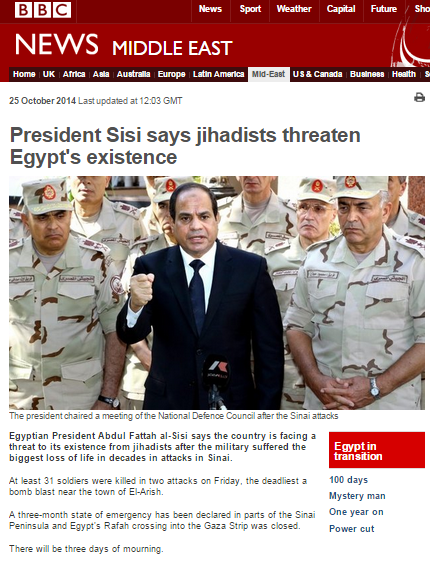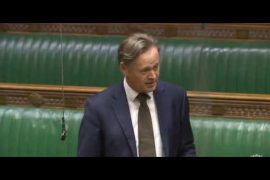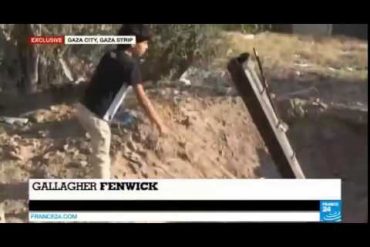October 25th saw the appearance of a report titled “President Sisi says jihadists threaten Egypt’s existence” on the BBC News website’s Middle East page. The article opens as follows:
“Egyptian President Abdul Fattah al-Sisi says the country is facing a threat to its existence from jihadists after the military suffered the biggest loss of life in decades in attacks in Sinai.
At least 31 soldiers were killed in two attacks on Friday, the deadliest a bomb blast near the town of El-Arish.
A three-month state of emergency has been declared in parts of the Sinai Peninsula and Egypt’s Rafah crossing into the Gaza Strip was closed.
There will be three days of mourning.
In a live TV address, Mr Sisi said a huge plot was being waged against Egypt “by external forces”.
“This is meant to break up Egypt and the Egyptians …. Egypt is fighting a war of existence.” “
One particularly remarkable aspect of this report is the laconic presentation of the Egyptian decision to indefinitely close the Rafah border crossing into the Gaza Strip, which continues in the filmed report from Orla Guerin embedded into the article. Describing the new security measures, Guerin tells BBC audiences:
“Now there will be various security restrictions including a curfew and the closure of Egypt’s border with the Gaza Strip – the crossing at Rafah – but that crossing is often closed for long periods at a time.”
Can we imagine a similar tone being adopted in BBC coverage if Israel decided to close the Erez or Kerem Shalom crossings indefinitely?
Another interesting point about this article is that whilst it notes President Sisi’s remarks about “external forces” – or “foreign hands” as much of the regional media translated his remarks – it has not been updated to include the comments made by an official in the Egyptian Interior Ministry:
“Maj. Gen. Sameeh Beshadi, who was formerly in charge of security in the North Sinai governorate where the attacks took place, said there was “no doubt that Palestinian elements had taken part in the attacks,” which killed at least 30 soldiers, according to security and medical officials.
He said the assailants had entered Sinai via the tunnels linking the region with the Palestinian territories, and that the assailants had prepared the booby-trapped vehicle which Egyptian authorities say was used to carry out one of the attacks while inside Egyptian territory. […]
“All the big terrorist operations which have taken place in North Sinai in the last few years involved well-trained Palestinian elements, including the attack on the military helicopter at the beginning of this year,” Beshadi said, referring to an attack which took place mid-January in the Kharouba area in North Sinai and which killed five soldiers.”
And:
“According to a report in the Egyptian al-Ahram cited by Israel Radio, which quotes an anonymous [Egyptian] intelligence official, the perpetrators of the attack Friday infiltrated the peninsula via a tunnel leading from the Gaza Strip. The same source added that although the Egyptian army destroyed over 1,500 tunnels that ran between Gaza and Sinai, some have been rebuilt and were being used to smuggle weapons, funds and manpower.”
This is precisely the sort of background information which has been consistently omitted from BBC portrayals of the border restrictions imposed by Egypt and Israel on the Gaza Strip both before the recent conflict and especially since July of this year when the corporation self-conscripted to context-free and inaccurate promotion of Hamas’ demands to lift those restrictions.




